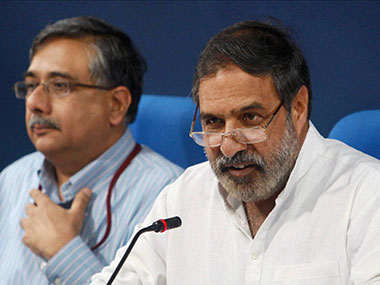The split between the Aam Admi Party and its partner Congress is wide open, all of a sudden.
The AAP government’s decision to reverse the retail FDI policy of the erstwhile Sheila Diskhit government in Delhi has kicked off a war of words between the party and Congress.
Though the AAP’s decision was no surprise as it is in line with its promise to traders in its election manifesto, Commerce Minister Anand Sharma, who has been trying his level best to get foreign retailers sign up, is clearly irked.
[caption id=“attachment_1300417” align=“alignright” width=“380”]  PTI[/caption]
“We are not a banana republic,” Sharma has told The Times of India, reacting to the AAP’s move.
According to him, India does not believe in policy reversal. The retail FDI policy was formulated after holding extensive discussions with farmers, consumers and industry. The minister has told the newspaper that he has sought legal opinion.
Meanwhile, Arvind Kejrival, Delhi Chief Minister and AAP leader, has said that his party was not against FDI per se but foreign stores in the retail segment will increase unemployment.
“The choice was to be made between giving more choices to consumers and controlling unemployment. Therefore, we took a stand against FDI,” Kejriwal has been quoted as saying in the report.
Sharma, however, has rejected Kejriwal’s contention. He is of the view that foreign retailers will help increase job opportunities not only in shops but in the supply chain too. The policy will help create better infrastructure too.
As the battle of wits rages, the Congress, which has been hard selling the policy to foreign retailers but without much of a success, is slowly but surely realising that this is only the beginning of the chain of reversals.
The new Rajasthan government under the BJP, which is opposed to the policy, is also likely to reverse the pro-FDI stance of the earlier government. Once this happens, the number of states allowing FDI in the segment will reduce to just about eight or nine.
The AAP’s policy reversal is likely to force the BJP to raise its pitch.
The rude shock, for the Congress and companies hesitantly signing JV pacts, will be when the new government that takes over at the Centre after the general elections decides to do away with the policy altogether.


)
)
)
)
)
)
)
)
)



